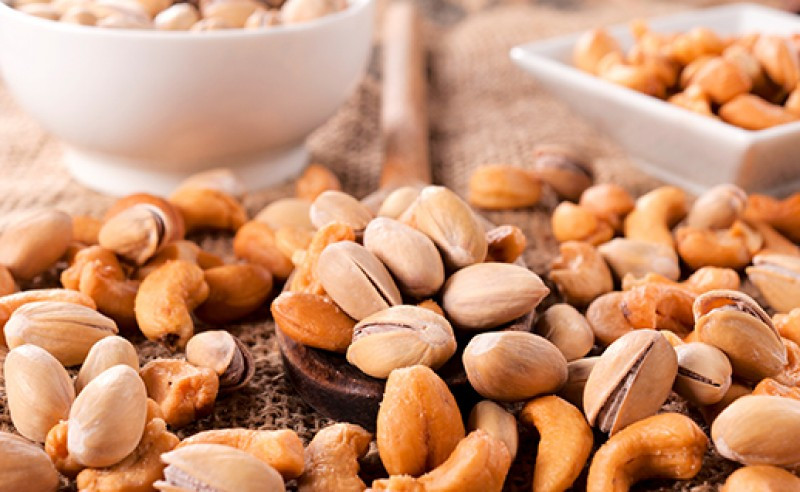The holiday season is here in full throttle, putting us smack-dab into the festive time of year when we find ourselves eating more food than usual—some of it even good for us! Between Thanksgiving and New Year's Day, we contend with about five weeks of navigating through office parties, church socials, and various get-togethers with family and friends, all of which typically involve an ongoing consumption of food, and beverages, much of which is not to be found on anyone's weight-loss list of foods to eat and enjoy. Holiday-season snacking is a given to help satiate those cravings in between meals, so let's focus in on that segment of our holiday eating habits for now. What are you putting into your mouth between breakfast and lunch, or between lunch and dinner, or between dinner and bedtime? Actually, don't answer that question; we really don't want to know. Instead, what we want you to know is that if you must have a snack to make it past 2 or 3 p.m., grab yourself a fistful of nuts. They can be quite good, and can be good for you if, of course, eaten in moderation. If one handful of assorted nuts is good for you, a dozen handfuls eaten one right after the other is not 12 times as good for you. Be sensible. And just to cover all our bases, let's include some types of seeds in this conversation as well. Nuts and seeds for snacking! Happy holidays, right? Absolutely. You've probably heard or read that nuts (and seeds) are high in fat and calories—which is why 'moderation' is the key word here—but they also contain protein, fiber, antioxidants (such as Vitamin E) and, as reported at huffingtonpost.com, what's known as 'plant stanols,' which may help in lowering cholesterol. Eaten in moderation (there's that word again, but it's important), nuts might even help prevent weight gain because they help you feel full longer, possibly discouraging you from overeating at the dinner table later on. Huffington Post also reports anecdotal evidence that nut eaters tend to have lower incidences of diabetes than those who don't partake of nuts.
Types of Healthy Nuts and Seeds
Among the types of nuts and seeds recommended for health snacking (in moderation, of course), are almonds, hazelnuts, pistachios, pine nuts, cashews, macadamias, pecans, Brazil nuts, walnuts, flaxseeds, chia seeds and hemp seeds. Of course, there are also peanuts, although the number of people suffering with peanut-related allergies has been on the rise in recent years, so a consultation with your primary-care doctor, nutritionist, allergist or other health-care professional is probably wise. Nut consumption has been a part of man's diet for centuries, but it is only in recent years that nuts and seeds have gained legitimacy in terms of inclusion in formal healthy-eating guidelines. In fact, according to the National Institutes for Health (NIH), "nuts have become an indispensable component of healthy diets and are included in the American Heart Association dietary metrics for defining ideal cardiovascular health in their recent report on setting goals for health promotion and disease reduction for 2020." Yes, that's a mouthful, but it's good news for the millions of us who could use some advice on what we should and should not put in our mouths this time of year—or any time of year for that matter. Here's the thing about all that fat in nuts we have been warned against—if there is such a thing as "good fat," nuts are high on the list for inclusion on our holiday party menus. According to webmd.com, the fats contained in nuts and seeds are mostly unsaturated and monounsaturated fats, meaning they shouldn't elevate "bad cholesterol" (LDL) levels. Along with that, monounsaturated fats from nuts could help raise "good cholesterol" (HDL) in our blood.Tips For Maximizing Nut's Healthy Benefits
It is understood that just like potato chips or cookies, it is hard to eat just one handful of nuts. It takes discipline, no question. But you can do it. Here is a handful of some other tips from webmd.com on how to work nuts and seeds into your diet in a healthy manner:- Choose breads with nuts in them, such as pumpkin or sunflower seeds.
- Next time you have a hankering for something chocolate, think a "snackpack" of nuts or sesame snaps.
- If sprinkling nuts on a salad, use a fat-free dressing.
- Nuts combined with cereal or dried fruits make a delicious, nutritious snack.
- Adding nuts to a vegetable dish, salad, pasta or casseroles can make for a tasty addition with some crunch to it.

